My Recollection
Herman saying that the pincer movement can’t fail against a 10 year old. Movie references. Nelson’s bi-racial buddies, more students we never see, victims of the move to modern animation.
The Episode
Ah, time to sit down and watch another episode of– shit this one’s in a hurry, it skipped the intro sequence and couch gag.
This episode feels more like an episode of Doug than it does The Simpsons. The first half is a standard run through an average child’s problems augmented by fantasy sequences to convey the emotional weight of the small made huge by limited perspective. The second half is the first step The Simpsons takes into the lucrative world of “references”. References are where one text references another by replicating visual, audio, or narrative elements. Wowza! I wonder if this fascinating new thing will take off.
Referential humor is something that gets a bit of a hard wrap and not undeservedly so, though I’d add that it’s less the existence of it and more the preponderance of it that draws negativity. Each, then, should be measured separately. It’s not a text’s fault if you’ve seen shitloads of the same thing in a week and it’s foolish to think that in a world full of active creators a random assortment of them should not do a thing because another random assortment has done it that week. It’s an invalid critical perspective. You’re the problem, so shake it off if you want to accurately assess something. This is not to say you can’t argue that a text is over reliant on them or uses them lazily, those are measurements within a text’s active control and are thus valid. But the tired old thing of not liking something because there’s a current surge in its popular use is childish contrarianism and not critique.
It’s a sign of how an early episode could have a real narrative focus, given that it had the luxury of fresh characters to explore, that you can summarize it in about a sentence. Lisa makes cupcakes for her class, Nelson’s friend steals them, Bart gets into a fight with the friend and then Nelson, and finally Bart enlists Grampa’s help to take down a neighbourhood bully.
GAZE ONCE AGAIN INTO THE WHEEL OF ETHNICITY!
GASP IN HORROR AS YOU SEE TWO CHARACTERS CURSED BY FATE AND WRITING STAFF ALIKE!
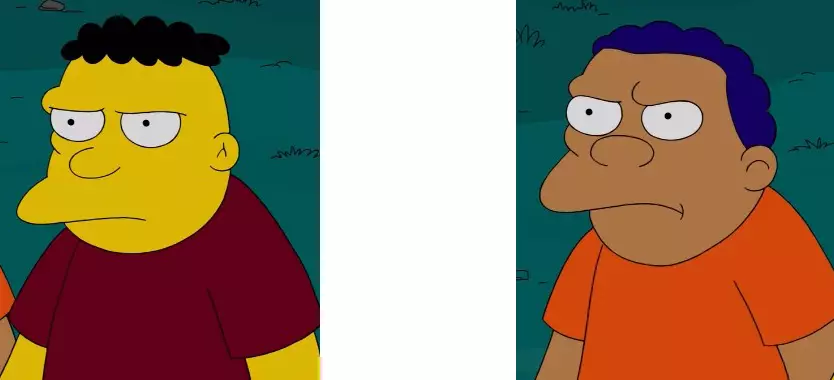
Nelson’s homunculoid little chums are what happens when you and your brother pick the same character. They are literally called Yellow Weasel and Black Weasel respectively because Groening had run out of family members and streets to name characters after. They stop being real people and become group shot filler pretty early.
LOAD THE HEADCANON
They are the result of Moe Szyslak sexually assaulting two women who had passed out in his bar.
The opening ten minutes are a fairly dry take on bullying from a child’s perspective with a not-quite-Kenobi-ish-enough-to-count-as-a-reference appearance of Homer in a thought bubble reminding Bart to punch balls. That moment itself is interesting more for it’s historical positioning as a very early example of how far rubber band reality can stretch than for how funny it is. Bart’s fantasies, about an unstoppable Juggernelson and his own funeral, smack heavily of Doug which, while it appeared 3 years later, made this stuff its bread and butter as The Simpsons moved on. This Dougian approach to Bart, noticeable here and in moments like his struggling with the aptitude test in Bart the Genius, was abandoned as Bart matured into something resembling a young adult trapped in a child’s body.
Homer’s advice of projectile spam and ducking mids doesn’t really work against a character with Nelson’s range and health so, on Lisa’s advice, Bart turns to Grampa for help. Early Grampa had an actual character trait in his endless letters of complaint, a trait that got moved to Flanders later on as the senility jokes became Grampa’s meat and potatoes. This is not Grampa’s first appearance but it’s his first point of focus in the series and there’s a note of meta to this introduction. One of the production notes the writers received was on the use of “family jewels” in reference to testicles, one they ignored to absolutely no penalty, and the term is amongst the words Grampa is demanding advertisers never put on TV again.
This is a real great line in public attitude stratigraphy, here in 1990 we have a note about the use of FAMILY FUCKING JEWELS being a bit much. Anyway, here’s a shot from Brother’s Little Helper nine years later.
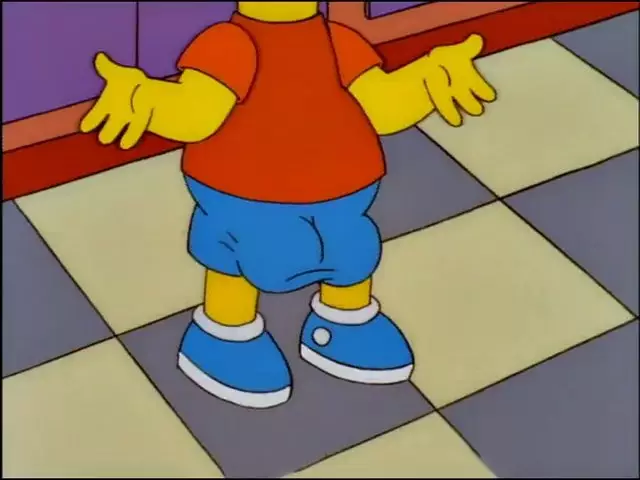
Ah the degeneration of culture. Sure there’s morons inventing pronouns to cover for their absolute lack of personality but, on the plus side, I can watch shows with swears.
After Jasper successfully wrestles the still unnamed Abe’s newspaper away from him, Grampa admits he may not be the best source of help and takes Bart to see Herman. Herman, (based on Simpsons writer, great novelist, and noted loon, John Schwartzwelder) is an interesting case of a very early side character who fell into such a suitable niche that he’s neither moved nor had a whole episode devoted to him. Here’s where The Simpsons leaps into its first major intertextual piece where Bart’s turn as General draws from Patton and Full Metal Jacket, using scenes, lines, music, and shots from both quite heavily.
There’s a threefold use to references. The first is adding layers of depth to theme, character, and narrative via allusions or direct references to existing works. Sorta like taking someone else’s big Lego spaceship and jamming your smaller Lego spaceship on top of it to make it look like one bigger, cooler Lego spaceship. In comedy it’s a simple, arguably cheap and lazy, means of creating surprise by hiding a familiar thing in an unfamiliar place. Finally, they can be used to fill time. They operate on a continuum between covert and overt, allusion and reference, and each, admittedly vaguely defined, spot on the spectrum serves a different purpose.
If you wanna look clever, you want to be subtle about your references typically to the point of them being invisible to anyone but people also familiar with the subject you’re referring to. These will often go unnoticed and occasionally be mistaken for original work by the referring text. These are less common in comedy because anything too subtle won’t work as a joke, though esoteric stuff often pops up in throwaway lines as a treat for the few who pick up on them. Generally, comedy will overtly signal that a reference is happening to invite people in on the joke and this episode is a good example of this. These kinds of references occupy a kind of middle ground because, while overtly signalled, they fit within the existing context of the referring text’s universe and narrative. The creativity behind this fit is what raises a good reference joke over a bad one. The way the referred text and reference text fit together will itself structure a joke or broader comment, adding the kinds of depth typical to literary allusions. At the far end of overt are things like Epic Movie or Family Guy cutaways. The ____ Movie movies are perfect examples of the laziest of reference humour because the referenced things contain no extra work in either turning their existence within the referring text into jokes or thought about how they are supposed to add to the narrative. They are simply known things in an unexpected place. Family Guy’s have so little relation to the underlying universe that they are wholly removed from it, requiring their own diegetic bracketing. This contrasts with American Dad which, while superficially similar, has enough absurdity within the foundation of it’s narrative world to connect the bizarre jokes to it in a meaningful way.
I feel like this entire part of the story exists purely for this exchange between Nelson and Bart:
Bart: I’m afraid I’m going to have to teach you a lesson
Nelson: Oh yeah? You and what army?
Bart: This one.
It’s a quality moment but I feel like it’s let down a little by the lack of build up to Bart’s guerrilla army. His need to fight Nelson makes sense, but the threat of Nelson, who is introduced in this episode, to the other children isn’t that well established. The entire idea of a horde of children taking down a bully with water balloons is into the rubber band reality’s stretch, but you don’t need to pull it as hard if you set a few more things up. The episode would have been served better by, and had the time for, a moment where Nelson’s threat to the larger student body was shown.
The absurdity of this as a resolution is acknowledged by the episode, Nelson points out that the second he is untied he’s going to beat Bart up, but the actual ending of Nelson signing a post-war document of surrender isn’t much better. Bullying is effectively dealt with in really only two ways, long form social change and removing the bully. Neither of these are an option for a sitcom so they’re going to be stuck with a kind of hand-wave fix. Pointing out the ridiculousness of one doesn’t improve the other. Bart’s direct address to the audience about war is another oddity. This kind of thing was generally saved for the Halloween episodes which exist in their own side reality. It adds nothing but a reminder of how clumsy the early seasons could be.
Jokes, lines, and stray thoughts.
There’s actually a few in this episode that got a good laugh out of me.
Homer appearing as an advice apparition to Bart and saying, “Remember the family jewels, son” kind of gets funnier the more I roll it around in my mind. Like when you say the word “truck” over and over again till it loses all meaning, the more you strip the context from this moment the funnier it gets. Imagine your dad communicating with you telepathically to remind you of testicles. Cause that’s all that’s happening here. He’s not reminding Bart to specifically punch testicles, he’s just reminding him that testicles are a thing. “Remember son, picture nuts”
Lisa describing Grampa as the, “toughest Simpson alive” then saying, “Yeah, remember the fight he put up when we put him in the home?” is a great cruel joke. I like throwaway lines whose brevity and unassuming presentation belie a really cruel scene. Lisa knows of her Grampa’s impressive strength and will to fight from the time she and her family physically ejected him from their home and locked him up in a retirement tomb. I imagine her cackling with laughter while doing it. This is a kind of iceberg joke. As a scene, it wouldn’t really work but as a sneaky reality hidden beneath a throwaway line we get a sense of an absurdity without the unpleasantness of witnessing it.
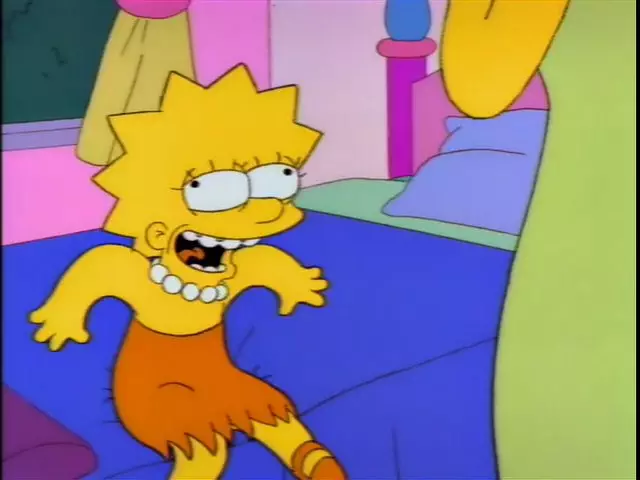
Grampa saying “horny” makes me chuckle.
There was originally going to be a running gag where Herman had a different story for the lost arm every time he was asked but it was cut from an episode and never returned to again. As much as I like a running gag like that, Herman’s comfortable position as a seldom-use makes his losing his arm in a school bus accident and not a war suit him well.
Black weasel. Yellow weasel. Black weasel. Yellow weasel. Black weasel. Yellow weasel. Black weasel. Yellow weasel. Black weasel. Yellow weasel. Black weasel. Yellow weasel. Black weasel. Yellow weasel. Black weasel. Yellow weasel.
Birthday balloons are terrible water balloons. They don’t burst on contact, I’ve seen them engulf an 8 year old’s head like The Blob before driving the confused child’s head into the ground.
Yours in keeping my arm inside the bus at all times, Gabriel.
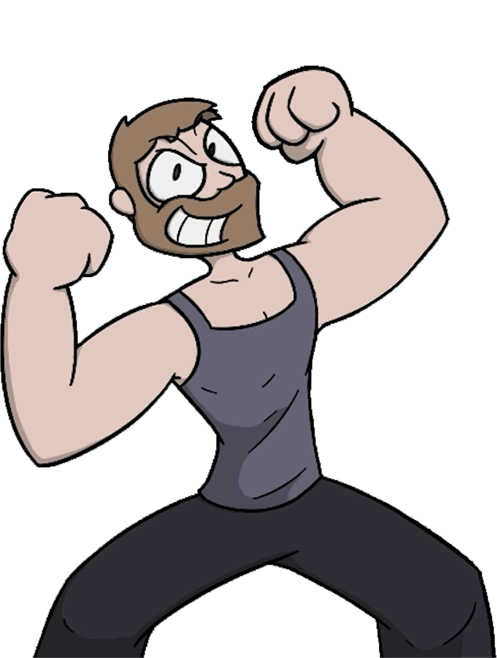
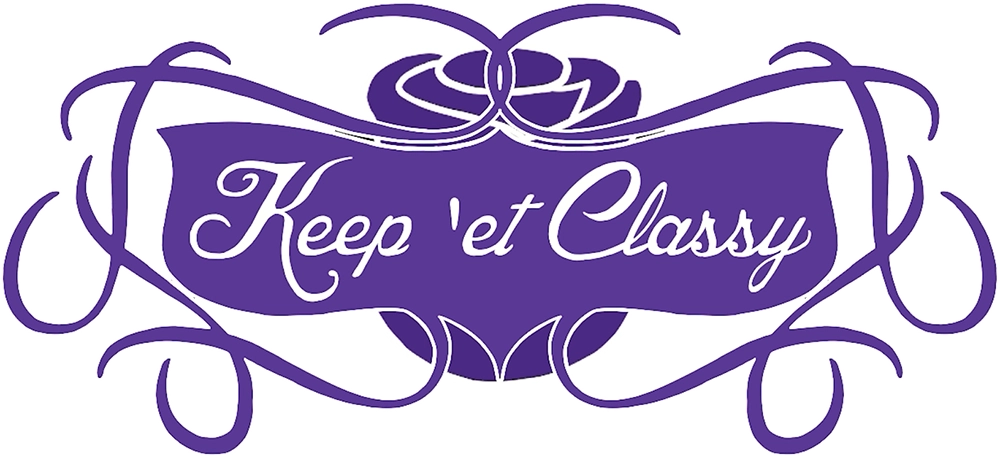

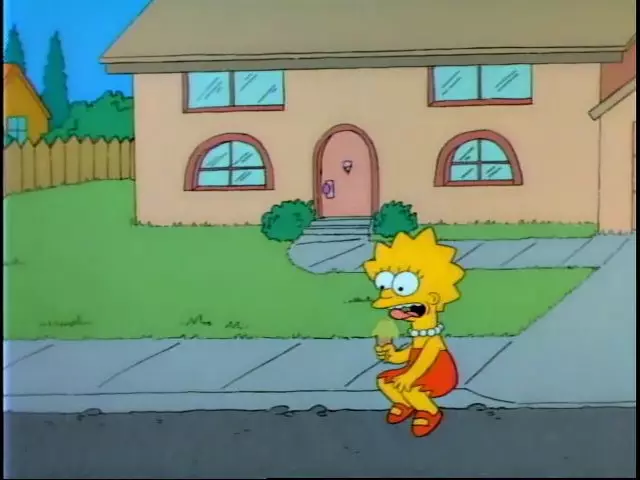

Comment on Bart The General
To reply, please Log in